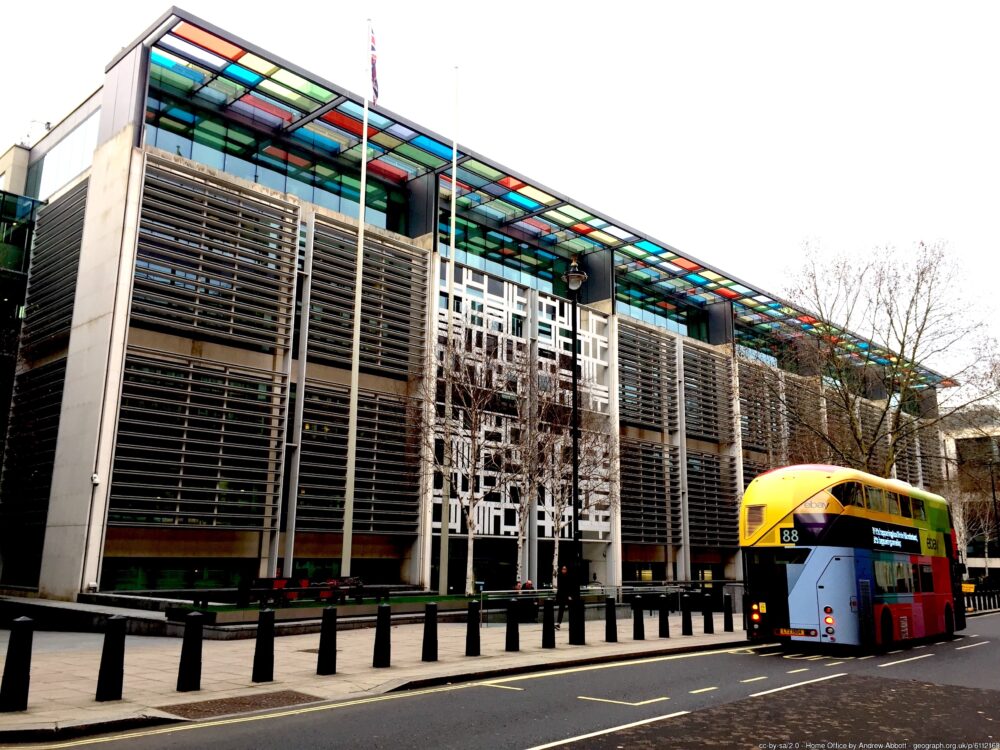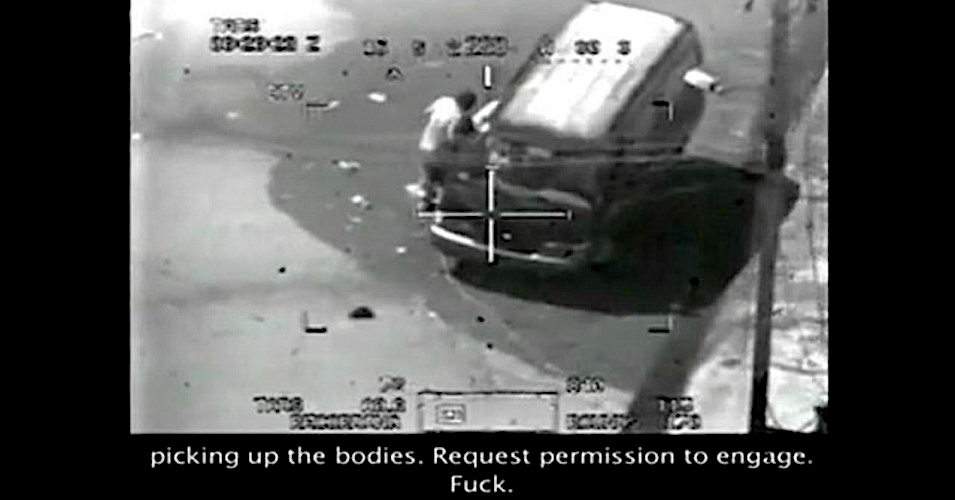Julian Assange’s persecution has nothing to do with the law. It is a simple demonstration of the crushing power of the state, writes Craig Murray.
There has never existed any government so evil and repugnant that it has been unable to find lawyers, and particularly judges, to do its bidding.
Hitler did not need to manufacture lawyers and judges. A very significant number, indeed the majority, of established and reputable German lawyers were prepared to participate actively in Nazi law, both its development and implementation.
That of course includes Roland Freisler, a Doctor of Law from the University of Jena, who was a practising solicitor before his elevation.
This was prosecutor Telford Thomas, opening the trial of Nazi lawyers at Nuremberg:
“This case is unusual, in that the defendants are charged with crimes committed in the name of the law. These men, together with their deceased or fugitive colleagues, were the embodiment of what passed for justice in the Third Reich.
Most of the defendants have served, at various times, as judges, as state prosecutors, and as officials of the Reich Ministry of Justice. ALL BUT ONE ARE PROFESSIONAL JURISTS. They are well accustomed to courts, and courtrooms, though their present role may be new to them.
But a court is far more than a courtroom; it is a process and a spirit. It is the house of law. This the defendants know, or must have known in times past. I doubt that they ever forgot.
Indeed, the root of the accusation in this case is that these men, leaders of the German judicial system, consciously and deliberately suppressed the law, engaged in an unholy masquerade of tyranny disguised as justice, and converted the German judicial systems to an engine of despotism, conquest, pillage and slaughter.”
Thomas’ quote “an unholy masquerade of tyranny disguised as justice” is a phrase that has been rattling around my head as a perfect encapsulation of the state “legal” process against Julian Assange, which I have been detailing this last several years.
Together, of course, with the fact that the NATO states hate Assange – and seek his judicial murder – precisely for revealing truths that embarrassed their system of “conquest, pillage and slaughter” in Iraq, Afghanistan, Libya, Yemen, Syria and elsewhere.
It is worth noting Hitler was by no means alone in being able to call on the respected lawyers to do his bidding.
The prosecutor of Stalin’s show trials, Andrei Vishinski, whom Freisler traveled to Moscow to see in action and whose screaming and taunting Freisler consciously copied, was also a “proper” lawyer, a graduate of the University of Kiev with a background of practice in Moscow.
(I should note in passing the counter case that Stalin’s favourite judge, Ulrich, was an auto-didact out of military tribunals).
We are brought up with an innate respect for the rule of law and belief that, though it makes mistakes, it is impartial and honest. Unfortunately, that is merely one of the myths by which our society functions. That is something I have reluctantly come to understand.
I was, nonetheless, so taken aback by Justice Jonathan Swift’s current and curt ruling, dismissing Assange’s High Court appeal in the extradition saga, that I thought I would dig a little deeper.
I therefore started with Swift’s surprising December ruling, in cahoots with Judge Lewis, that the Tory government’s scheme to deport refugees to Rwanda is lawful.
His judgment depends above all on the notion that any fiction concocted by the U.K. government has more legal force than actual fact. There is no real world doubt that Rwanda is a ghastly dictatorship and kills opponents. Nor that it has killed the inhabitants of refugee camps on its soil.
But that is OK, say Swift and Lewis, because the government of Rwanda has said in an MOU that it won’t do that to our refugees, who are different to those other refugees:
“73. The Claimants rely on what happened in 2018 when refugees from neighbouring countries at Kiziba refugee camp protested at the conditions in the camp. It has been reported (for example, by Human Rights Watch) that the police who entered the camp in response to the protests used excessive force. They fired on the refugees and some were killed. The Claimants also point more generally to limits in Rwanda on the freedom to express political opinion if that opinion is critical of the Rwandan authorities.
74. We do not consider that any direct inference can be drawn from the events at Kiziba refugee camp in 2018. The circumstances that led to those protests are unlikely to be repeated for any person transferred to Rwanda under the MEDP. The treatment of transferred persons, both prior to and after determination of their asylum claims is provided for in the MOU (at paragraphs 8 and 10) and in the Support NV. For the reasons already given, we consider the Rwandan authorities will abide by the terms set out in those documents.”
…
On top of which, the Refugee Convention, according to Swift and Lewis, says that refugees must be treated no worse than a state’s own citizens. So if Rwanda persecutes its own people, then there is no breach in persecuting the refugees we send too.
“…the Claimants’ case comes to the proposition that, following removal to Rwanda, it is possible that one or more of those transferred might come to hold opinions critical of the Rwandan authorities, and that possibility means that now, the Soering threshold is passed.
77. There is evidence that opportunities for political opposition in Rwanda are very limited and closely regulated. The position is set out in the “General Human Rights in Rwanda” assessment document, one of the documents published by the Home Secretary on 9 May 2022. There are restrictions on the right of peaceful assembly, freedom of the press and freedom of speech. The Claimants submitted that this state of affairs might mean that any transfer to Rwanda would entail a breach of article 15 of the Refugee Convention (which provides that refugees must be accorded the most favourable treatment accorded to nationals in respect of non-political and non-profit-making associations and trade unions). However, we do not consider there is any force in this submission at all. Putting to one side the fact that article 15 does not extend to all rights of association, it is, in any event, a non-discrimination provision – i.e., persons protected under the Refugee Convention must not be less favourably treated than the receiving country’s own citizens. There is no evidence to that effect in this case.”
Indeed, Swift and Lewis tell us, the defendant’s case is “speculative”. There is no evidence that the government of Rwanda will wish to torture them, simply because the government of Rwanda hasn’t even met them yet. Besides, the government of Rwanda has promised not to mistreat people under an agreement with the U.K., “the MEDP”, which gives the Rwandan government 120 million of cash to steal, or spend on Rwanda’s economic development.
“Returning to the material covered in the Home Secretary’s assessment document, there is also evidence (from a U.S. State Department report of 2020) that political opponents have been detained in “unofficial” detention centres and that persons so detained have been subjected to torture and article 3 ill-treatment short of torture. Further, there is evidence that prisons in Rwanda are over-crowded and the conditions are very poor. Nevertheless, the Claimants’ submission is speculative. It does not rest on any evidence of any presently-held opinion. There is no suggestion that any of the individual Claimants would be required to conceal presently-held political or other views. The Claimants’ submission also assumes that the response of the Rwandan authorities to any opinion that may in future be held by any transferred person would (or might) involve article 3 ill-treatment. Given that the person concerned would have been transferred under the terms of the MEDP that possibility is not a real risk.”
Swift and Lewis argue further, at paras 81 to 84, that in U.K. domestic law, the Home Secretary’s certification of Rwanda as a safe country is “irrebuttable” – ie there is no legal avenue to question its truth, and nor does it require parliamentary approval. The “safety” of Rwanda is a fact in law simply because Home Secretary Suella Braverman certifies that it is.
Having stated that under Tory immigration legislation the Home Secretary can certify anywhere she feels like as safe, irrespective of objective truth (provide certain procedural steps are taken) Swift and Lewis then go on to the non-sequitur on which their judgment depends, that because a country has been certified “safe” for the purposes of U.K. domestic law, that makes it actually eligible for receipt of U.K. deportees in terms of the U.N. Refugee Convention.
The U.N. Refugee Convention says this:
“No Contracting State shall expel or return (“refouler”) a refugee in any manner whatsoever to the frontiers of territories where his life or freedom would be threatened on account of his race, religion, nationality, membership of a particular social group or political opinion.”
That is the obligation under international law, incorporated into British law. It does not disappear with a signature from the Home Secretary, but depends on the actual, real state of affairs.
It would not, in real life or in the Refugee Convention, be safe to deport people to Yemen, Eastern Ukraine nor the Sudan just because Braverman signed something. The Refugee Convention is not subject to the fantasy propositions of “irrebuttable” Whitehall certificates.
As devoted servants of the Executive, Lewis and Swift undeniably have one thing in common with Freisler, Ullrich and Vishinski, which is an impatience with pesky defendants bothering them with evidence, troublesome arguments and annoying amounts of paper, and trying to save their own lives.
Lewis and Swift begin their judgment on Rwanda with a full throttled rant at the annoyance of having to wade through the paperwork that the deportees had the downright cheek to produce in defence:
“36. The pleadings in these proceedings are not models of good practice. Practice Direction 54A requires Statements of Facts and Grounds to be clear and concise. None of the pleadings meets this requirement, even though many if not all have been revised one or more times since the proceedings were issued. On the Claimants’ side the pleading in claim CO/2032/2022 (AAA and others) has taken pole position, setting out various generic grounds of challenge as well as grounds specific to the facts of the cases of the individual claimants in that case. Seven generic grounds of challenge are pleaded (Grounds 1, 1A – 1C, 2A and 3-6). However, these grounds tend to overlap or circle back on one another. Other claims brought by other Claimants have adopted these generic grounds of challenge or formulated variations on them, as well as pleading complaints based on their own circumstances. The pleading in CO/2056/2022 (the Asylum Aid case) raises complaints about the Home Secretary’s decision-making procedure. What is said about procedural fairness in this case largely overlap with the complaints on procedural fairness raised in CO/2023/2022 and other claims. Asylum Aid contends that these matters demonstrate there is systemic unfairness in the procedure adopted to deal with the inadmissibility and removal decisions. The Home Secretary pleading is a response in kind. The Amended Detailed Grounds of Defence (to all claims) runs to some 215 pages.
37. At the court’s request the parties prepared an agreed list of issues. However, that exercise failed to simplify the position: the list identifies 29 generic issues, many of which are repetitive or overlapping; and many more issues specific to each claim.
38. The same approach has been repeated in the Skeleton Arguments. Mention should be made of the Skeleton Argument in CO/2032/2022 and CO/2104/2022 (262 pages), and the Skeleton Argument in CO/2094/2022 (63 pages). Each comfortably exceeds the maximum length permitted by Practice Direction 54A (25 pages). Permission to file skeleton arguments longer than the maximum permitted was not requested in advance; each document was presented to the court as a fait accompli. The length of these documents has not served to clarify the way in which the various complaints are put. The documents meander and repeat themselves.”
This is plainly a particular bugbear of Swift. My examination of his ruling on Rwanda deportations is only a prelude, to put into context this ruling on the Assange appeal. What I have found common to both decisions is an insistence that narrative put forward by the executive is not to be questioned, and an extreme distaste for having to entertain lengthy arguments on behalf of those individuals whose lives hang in the balance.
The Assange Appeal
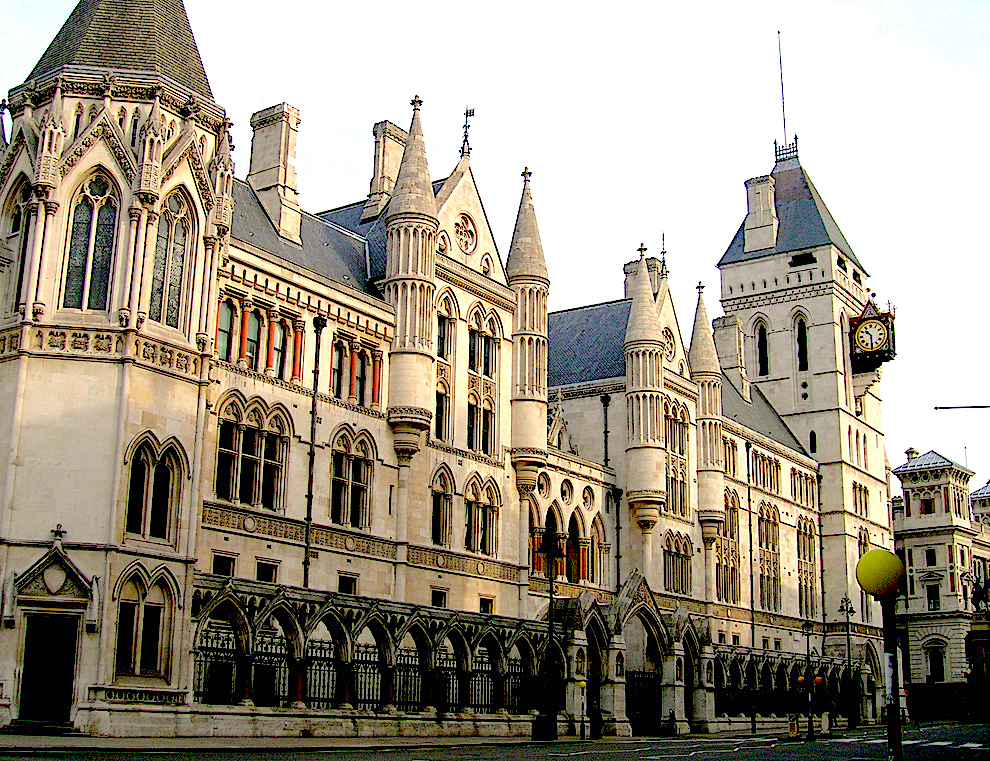
The Royal Courts of Justice on the Strand in the City of Westminster, where the London High Court is based. (Sjiong, CC BY-SA 2.0, Wikimedia Commons)
I consider the High Court appeal of Julian Assange to be, in itself a document of historic importance. I have therefore decided to publish it in full, and I recommend you at the very least to dip in to it.
The very first sentence of Assange’s Appeal rings out loud, and explains why his extradition proceedings were held effectively in closed court and why the High Court are determined to avoid any substantive public hearing:
“Julian Assange and Wikileaks were responsible for the exposure of criminality on the part of the U.S. Government on a massive and unprecedented scale.”
In the first 3 pages (of 150), it outlines the argument and the ground it covers (DJ is District Judge Vanessa Baraitser):
“IN THE MATTER OF AN APPEAL UNDER S.103 OF THE EXTRADITION ACT 2003
B E T W E E N:
JULIAN ASSANGE
Appellant
v
GOVERNMENT OF THE UNITED STATES OF AMERICA
Respondent
__________________________________________________________
PERFECTED GROUNDS OF APPEAL
____________________________________________________________
References to CB/X are references to the core permission bundle.
EB/X are references to the section 103 evidence bundle.
1. Introduction
1.1. Julian Assange and Wikileaks were responsible for the exposure of criminality on the part of the U.S. Government on a massive and unprecedented scale. The publication in 2010 and 2011 of materials sent by a serving military officer, Private Manning, sit at the very apex of publicinterest disclosures. By publishing this material ‘WikiLeaks…exposed outrageous, even murderous wrongdoing [including] war crimes, torture and atrocities on civilians’
(Feldstein, EB/10, §4).
1.2. Julian Assange’s work, dedicated to ensuring public accountability by exposing global human rights abuses, and facilitating the investigation of and prosecution for state criminality, has contributed to the saving of countless lives, stopped human rights abuses in their tracks, and brought down despotic and autocratic regimes.
1.3. Those who expose grave state criminality, defenders of fundamental human rights, are, and always have been, vulnerable to acts of political retaliation and persecution from the regimes whose criminality they expose. Julian Assange is no exception.
1.4. The law is fiercely protective of human rights defenders. Exposure of state criminality is, in law, a protected political act, the product of a political opinion. Prosecutions ‘on account of’ such acts are straightforwardly prohibited by s.81 of the 2003 Act.
1.5. The history of this prosecution, between Mr Assange’s exposures in 2010 and 2011 and the indictment in 2018, is a textbook example of political persecution. The course of this case since 2011 is simply extraordinary. It involves, inter alia, U.S. Governmental plots to interfere with judges who investigate the matters Mr Assange exposed; to silence the International Criminal Court (ICC) who have taken up Mr Assange’s disclosures; and to kidnap and rendition Mr Assange himself, or else murder him. What follows below is conduct of the type one would normally expect from a military dictatorship. The DJ failed to act upon (or even address) these issues from the perspective of s.81 because (despite having the law drawn squarely and repeatedly to her attention) she failed to recognise or acknowledge that exposure of state criminality is, in law, a protected ‘political’ act, engaging s.81.
1.6. The evidence in this case has, moreover, developed since the DJ’s decision in January 2021. Investigations in America now provide a fuller picture of the U.S. state-level plans to kidnap, rendition and murder Mr Assange. They also reveal that the initiation of criminal proceedings in this case – by a criminal complaint in December 2017 resulted after obstacles (some reported as having been erected by the U.K.) to those criminal plans.
1.7. The prosecution that the U.S. were forced to resort to instead, commenced in 2018, is no less extraordinary. (a) It is unprecedented in law. (b) It cuts clean across established principles of free speech. (c) To deal with that, it anticipates a trial at which Mr Assange, as a foreigner, can be denied reliance on the First Amendment (d) indeed, a trial outwith protections of the U.S. Constitution altogether, and (e) is accompanied by exposure to a grossly disproportionate sentence. In short, the circumstances of the prosecution are so stark and unusual that they engage bars to extradition in their own right.
1.8. As to the circumstances of the ensuing extradition request. (f) It violates the prohibition on extradition for political offences expressly provided for in the relevant treaty and under international law. (g) It deliberately misstates the core facts. The DJ took these issues one by one and reasoned that none offended the 2003 Act. For reasons which follow, she was plainly wrong in multiple respects.
1.9. But even if she were right on each of these issues when viewed separately, the DJ then needed, but failed entirely, to stand back and examine what they cumulatively told her about the political origins of this case. They were all, in short, individually and cumulatively, the clearest evidence of a prosecution mounted ‘on account of’ Mr Assange’s political opinions – namely his stated and proven commitment to the exposure of U.S.-state-level criminality.
1.10. These Perfected Grounds of Appeal, served in accordance with Crim PR r.50.20(5), are structured as follows:
1.11. Part A: addresses Ground of Appeal 1, namely that the judge wrongly rejected the argument that the request was being made for the purposes of prosecuting or punishing Julian Assange for his political opinions, and therefore barred by s.81(a).1 Accordingly Part A provides an overview of the history of this matter, and explains the over-arching s.81 case the DJ failed to engage with. This includes:(i) Section 2: the evidence before the DJ concerning Mr Assange’s political opinions;
(ii) Section 3: the evidence before the DJ about the criminality Mr Assange exposed.
1 Ground 1 also encompasses the allegation of abuse of process, by reason of ulterior motivation of the request and the underlying prosecution, which is dealt with in Part D.
(iii) Section 4: The law the DJ ignored;
(iv) Section 5 and 6: the other evidence before the DJ concerning the origins of the 2018 prosecution.
(v) Section 7: The DJ’s decision
1.12. Part B: addresses Grounds of Appeal 2 to 6. That is the various egregious aspects of the prosecution, eventually commenced in 2018, which individually bar extradition, regardless of
s.81; including: (i) Section 9: An unprecedented prosecution (Ground of Appeal 2: Article 7 ECHR);
(ii) Section 10: A prosecution for protected speech (Ground of Appeal 3: Article 10 ECHR);
(iii) Section 11: A prosecution designed to secure a guilty verdict (Ground of Appeal 4: Article 6 ECHR);
(iv) Section 12: A prosecution with no Convention Rights protections at all (Ground of Appeal 5);
(v) Section 13: Followed by a grossly disproportionate sentence (Ground of Appeal 6).
1.13. Part C: addresses Grounds of Appeal 7 to 8. That is the aspects of the ensuing extradition request which individually bar extradition, regardless of s.81; including:
(i) Section 14: An extradition request for political offences, in violation of the treaty and international law (Ground of Appeal 7);
(ii) Section 15: An extradition request which deliberately misstates the core facts, unfairly improperly and inaccurately (Ground of Appeal 8).
1.14. Part D: returns to s.81 and abuse of process (Ground of Appeal 1), as the DJ ought to have done, in Section 16. Finally, Sections 17 and 18 address the new evidence in this case.”
There follows a further 147 pages of outstanding legal argument, including compelling evidence. The summary of the crimes of the U.S. Government exposed by Julian Assange at pages 9 to 18 is simply mind-blowing. That section starts thus:
“Every single one of the five ‘national security’ publications that are the subject of this extradition request exposed U.S. Governmental involvement in crimes of the first order of magnitude. These disclosures exposed irrefutable evidence of, inter alia, illegal rendition, torture, and black site C.I.A. prisons across Europe, as well as aggressive steps taken to maintain impunity and prevent the prosecution of any American operatives involved in these crimes. The following represents the unchallenged evidence before the DJ of the atrocities Mr Assange exposed.”
Here is just one example of the ensuing evidence:
“3.3. Mr Stafford-Smith’s unchallenged evidence was that cables, for example, revealed by WikiLeaks regarding U.S. government drone killings in Pakistan ‘contributed to [subsequent] court findings that U.S. drone strikes are criminal offences and that criminal proceedings should be initiated against senior U.S. officials involved in such strikes’ (Stafford-Smith, EB/22, §84, 91). ‘Those were very important in litigation in Pakistan’ (EB/40 Tr 8.9.20, xic, p4). The Peshawar High Court ruled, inter alia, that the drone strikes carried out by the C.I.A. and U.S. authorities were a ‘blatant violation of basic human rights’ including ‘a blatant breach of the absolute right to life’ and ‘a war crime’ (Stafford-Smith, EB/22, §91). What ‘we have to term criminal offences were taking place’ (EB/40 Tr 8.9.230, xic. p4). Moreover, and as a result, ‘the drone strikes, which were in their hundreds and causing many…innocent deaths, stopped very rapidly’ such that ‘there were none reported…in 2019’ (Stafford-Smith, EB/22, §93). WikiLeaks had ‘put a stop to a massive human rights abuse’ (Stafford-Smith, EB/22, §92-93). ‘Pakistan was an American ally. It was not like we were doing that to an enemy, and that again is just extraordinary to me’ (Stafford-Smith, EB/40 Tr 8.9.20, re-x, 26-
27). Without the WikiLeaks disclosures, it ‘would have been very, very different and very difficult’ to prevent this crime (Stafford-Smith, EB/40 Tr 8.9.20, xic, p5).”
There is much other material in the appeal which the U.S. and U.K. governments would not wish to be rehearsed in public:
“Secondly, the report provides further, corroborative, evidence (not available to the DJ) of the fruit of the resulting ‘no limits’ discussions. Namely, the emergence of U.S. Governmental plans about which Witness 2 (EB/2) gave evidence to the DJ to:
(i) Kidnap Mr Assange:
‘This Yahoo News investigation, based on conversations with more than 30 former U.S. officials — eight of whom described details of the C.I.A.’s proposals to abduct Assange’ (p2)
‘Pompeo and [Deputy C.I.A. Director Gina] Haspel wanted vengeance on Assange. At meetings between senior Trump administration officials after WikiLeaks started publishing the Vault 7 materials, Pompeo began discussing kidnapping Assange’ (p18)
(ii) In order to rendition Mr Assange to the U.S.:
‘Pompeo and others at the agency proposed abducting Assange from the embassy and surreptitiously bringing him back to the United States via a third country — a process known as rendition. The idea was to ‘break into the embassy, drag [Assange] out and bring him to where we want,’ said a former intelligence official’ (p18)
(iii) Or else murder Mr Assange:
‘Some senior officials inside the C.I.A. and the Trump administration even discussed killing Assange, going so far as to request ‘sketches’ or ‘options’ for how to assassinate him. Discussions over kidnapping or killing Assange occurred ‘at the highest levels’ of the Trump administration, said a former senior counterintelligence official. ‘There seemed to be no boundaries’’ (p1)
‘Some discussions even went beyond kidnapping. U.S. officials had also considered killing Assange, according to three former officials. One of those officials said he was briefed on a spring 2017 meeting in which the president asked whether the C.I.A. could assassinate Assange and provide him ‘options’ for how to do so’ (p20) ‘agency executives requested and received ‘sketches’ of plans for killing Assange … said a former intelligence official. There were discussions ‘on whether killing Assange was possible and whether it was legal,’ the former official said’ (p20).”
Swift dismisses the 150 page appeal in just three pages, with a curt and sneering rejection.
“There are 8 proposed grounds of appeal. They are set out at great length (some 100pp), but the extraordinary length of the pleading serves only to make clear that the proposed appeal comes to no more than an attempt to re-run the extensive arguments made to and rejected by the District Judge.”
Swift then stipulates that if Assange’s lawyers apply for a hearing for their request for an appeal to be heard, then that hearing will be limited to 30 minutes.
Furthermore, he limits Assange’s defence to just 20 pages. 20 pages and 30 minutes (the latter being the time for the entire hearing, including the response by the U.S. government). That is the value Swift places on pleadings for a man’s life. Swift even aims a prim taunt at the defence: “The present grounds of appeal are unwieldy and do not comply with any known rules of pleading”.
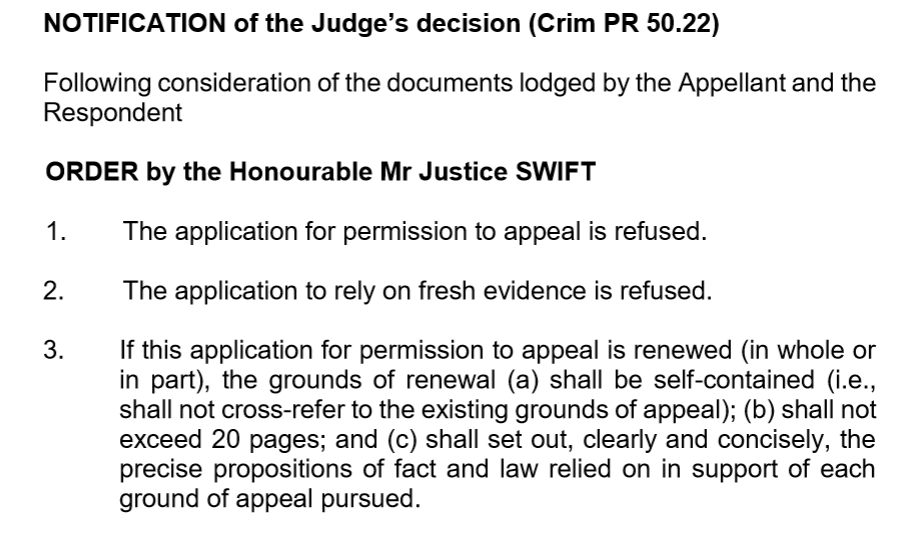
Swift states that “the issue is the one posed by section 103 of the 2003 (Extradition Act); ought the judge to have decided a question at the extradition heariing differently”. Swift then subjects this “issue” to impossible constraints. The judge’s evaluation of fact nor their assassment of argument can be revisited. He also objects to new evidence, even though new evidence at appeal is specifically allowed by the Extradition Act.
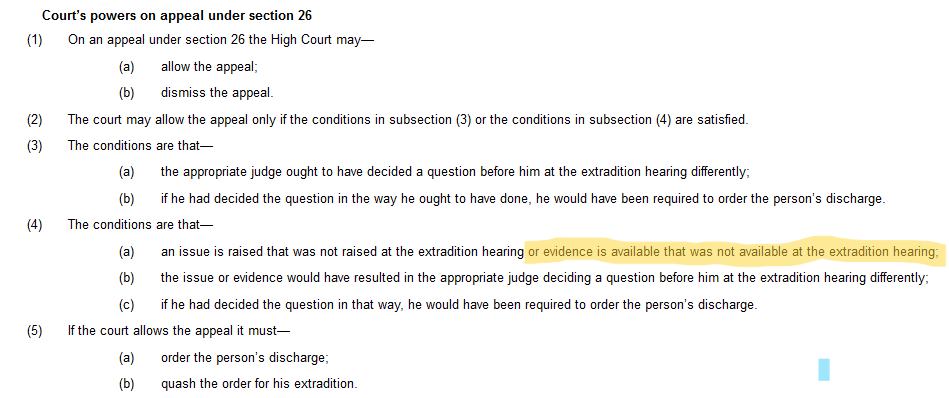
Swift’s background is as a government lawyer. He revealed something of himself in this interview with a legal magazine, where he stated that:
“Favourite clients were the security and intelligence agencies. ‘They take preparation and evidence-gathering seriously: a real commitment to getting things right.’”
and
“What really matters is that the bond of confidence between Executive and Judiciary is maintained.”
But perhaps even more revealing is that in this brief interview about his career, he chooses to throw in an entirely gratuitous and pointed anecdote about how unpleasant left wing people are, which perforce implies he was coming from an opposite position:
“The first member of his family to go to university and the first to be a lawyer, he remembers his welcome at New College. ‘I unpacked and knocked on the door opposite to introduce myself. ‘Hello, I’m Jonathan,’ only to get the response ‘I’m Dave. I’m a Militant. F*** off!’’ After all, it was the mid-1980s.”
It is perfectly plain what Swift is, and that he could be entirely relied on to dismiss Assange’s appeal with no discussion of any difficult subject matter on state crimes.
In the District Court, Judge Baraitser ruled against Assange on the eight grounds, but had ruled for him on the grounds of mental health and U.S. prison conditions. This resulted in the complicated process of successive High Court appeals.
First the United States was permitted to appeal on health and U.S. prison conditions. After they won, it was Assange’s turn to appeal on those other eight grounds, on which he had lost at the District Court.
The difference between the High Court treatment of the U.S. appeal, which was accepted and eventually won, and Assange’s appeal, which is dismissed out of hand, is highly instructive.
The U.S. appeal turned very largely on new evidence. That consisted of new diplomatic assurances from the USA in which they stated that Assange would not be placed in a super-max prison pre-trial and would not be subjected to Special Administrative Measures – unless it became necessary to do so.
These “assurances” could have been given during the original hearing but were not, because of course the U.S. has every intention of placing Julian in super-max prison. Judges Burnett and Holroyde, ruling in favour of the USA, airily stated that the new assurances were admissible because assurances were not “evidence”:
“A diplomatic note or assurance letter is not “evidence” in the sense contemplated by section 106(5)(a) of the 2003 Act: it is neither a statement going to prove the existence of a past fact, nor a statement of expert opinion on a relevant matter. Rather, it is a statement about the intentions of the requesting state as to its future conduct …”
So they ruled that, while new evidence is excluded, new “assurances” are not, a bit of special pleading they simply picked out of their capacious arses.
Compare this to the evidence submitted by Assange that the USA spied on his legal defence team and plotted to kidnap him, while actively discussing his assassination. That is excluded on the basis that it is “new evidence”, and on the fact that it is in part based on journalistic reports. The fact that the U.S. government’s star witness has admitted he lied and gave his evidence for money, has also been dismissed on the grounds that information is available from journalistic reports.
Yet a media interview with one of the psychiatrist witnesses for Julian Assange, introduced by the U.S. as part of their High Court appeal, was accepted, and not excluded as either “new evidence” or a “press report”.
You can read the entire the Burnett and Holroyde judgment, discussing the District Judge’s assessment of the evidence of Julian Assange’s mental health and U.S. prison conditions, and it is impossible not to conclude that they are absolutely “second guessing the original judge’s evaluation of the facts and assessment of the arguments”.
There is literally nothing else they are doing.
Therefore, in finding for the USA appeal, the High Court conducted precisely the exercise which Swift rules is out of order when argued for the other side of the case, for the Assange appeal.
My favourite bit of stinking hypocrisy from Holroyde and Burnett comes at para 45:
“Extradition proceedings are not private law proceedings but a process through which solemn treaty obligations are satisfied in the context of a framework which ensures that a requested person is provided with proper safeguards.”
The phrase “solemn treaty obligations are satisfied” should cause an immediate revulsion. The Treaty in question is the U.S./U.K. Extradition Treaty of 2003, and it states at Article 2 that there can be no political extradition.
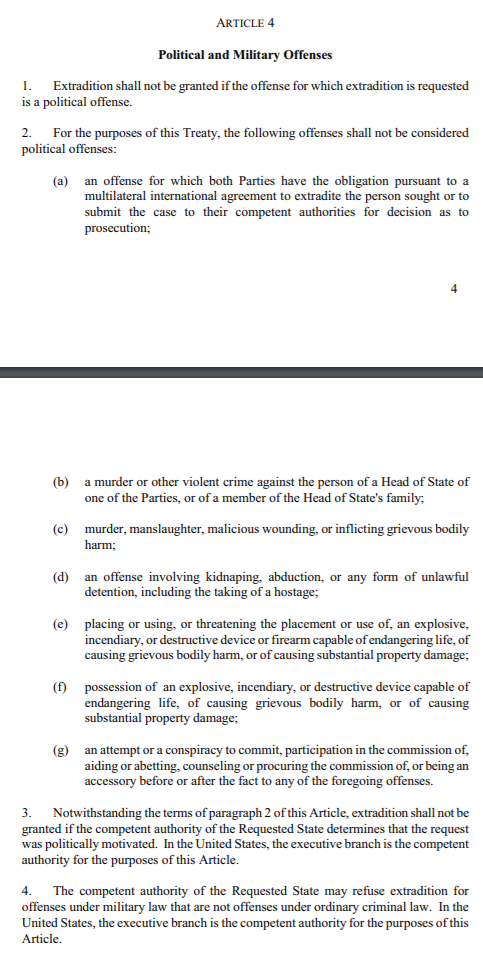
The District Court ruling, specifically upheld by Swift now, is that the U.K./U.S. Extradition Treaty has no legal standing and therefore the bar on political extradition it contains does not apply. Swift accepts the argument, that as the 2003 Extradition Act does not include a bar on political extradition, that provision of the Treaty does not apply.
The Extradition Treaty, Swift baldly states, is “not justiciable”, ie cannot be taken into legal account.
How it can both be that, and be a “solemn obligation” at the base of these entire proceedings, is an extraordinary contradiction which worries none of these judges in their concern to quickly and efficiently impose the brute force of the state. The entire process is designed as punishment for Assange’s unauthorised revelation of truth.
How an extradition can take place specifically under a Treaty whose provisions cannot be applied to that extradition, is a logical conundrum to which only the sophisticates of the U.K. judiciary could adapt their flexible intellects and – more to the point – consciences.
The executive will always find the judiciary needed to do its dirty work. Any executive. There may be occasional blips in periods of political convulsion. There was a temporary standoff with the Supreme Court over facets of Brexit, for example. But the judiciary will realign themselves with the executive in quick time. The power of the State is the constant.
Julian’s persecution has nothing to do with the law. It is a simple demonstration of the crushing power of the state.
*
Craig Murray is an author, broadcaster and human rights activist. He was British ambassador to Uzbekistan from August 2002 to October 2004 and rector of the University of Dundee from 2007 to 2010. His coverage is entirely dependent on reader support. Subscriptions to keep this blog going are gratefully received.
This article is from CraigMurray.org.uk.


